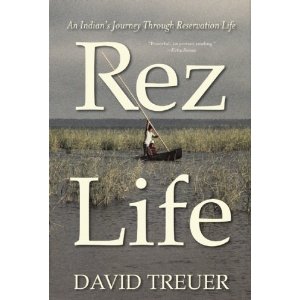
Book Review: “Rez Life: An Indian’s Journey Through Reservation Life” by David Treuer
 Rez Life not only divulges in detailed histories of Indian past, but also successfully target the reader’s sentimental side through interviews and personal stories. Simply reading about Indian boarding schools is shocking and sad, but being exposed to a real person who went through not just the typical abuse—taken away from his parents, physically punished for speaking his native language, etcetera—but who was also repeatedly raped at the hands of a residential director—well, that makes history a little too uncomfortably real. Treuer’s writing talent further shines through with some extremely brilliant imagery of the northern Minnesotan woods, his grandfather, powwows, and more. (His prose describing northern Minnesota made me homesick—and I’m from the Cities.)
Rez Life not only divulges in detailed histories of Indian past, but also successfully target the reader’s sentimental side through interviews and personal stories. Simply reading about Indian boarding schools is shocking and sad, but being exposed to a real person who went through not just the typical abuse—taken away from his parents, physically punished for speaking his native language, etcetera—but who was also repeatedly raped at the hands of a residential director—well, that makes history a little too uncomfortably real. Treuer’s writing talent further shines through with some extremely brilliant imagery of the northern Minnesotan woods, his grandfather, powwows, and more. (His prose describing northern Minnesota made me homesick—and I’m from the Cities.)
Furthermore, Treuer does a good job at staying unbiased; he isn’t afraid to show “bad” moments in Indian history, in which the Indians were the ones acting greedily, racist, or violently. He inserts his opinion at times, usually to explain, quite strongly, what he thinks Indians, whites, and reservations should do in the future to address the issues he brings up. Although these statements sometimes feel out of place within the chapter, their addition helps in creating a fuller experience for the reader.
However, Rez Life doesn’t challenge quite as much as inform. The book reads as a first step to exposing people to reservation problems, though this isn’t to say that is it lacking in detail. (In fact, it works as a “first step” because all the details are clearly well explored and connected.) Through the stories and facts it provides, there is hope that the reader will be inspired enough to learn more about Indian culture and current state of affairs. Treuer may include some opinions as to what should be done, but generally this is left up to the reader; something needs to change, and the first step towards this change is opening one’s mind.
Knowing Treuer today as an acclaimed novelist, writer, and professor at University of Southern California (and very passable as a typical Caucasian), I had difficulty placing him in the reservation childhood and life he describes at Leech Lake. He does not fulfill the stereotype of someone brought up on the reservation—a stereotype he addresses within the pages of Rez Life—which is generally someone who is poor, alcoholic, and likely has spent time in jail. But people like this aren’t unfamiliar to Treuer, as we learn through his descriptions of childhood friends, friends’ children, and even family. As much as Rez Life is targeted to the white American middle class, to expose them to what they are normally blind, it is also for Indians, those Treuer knows personally and those all over the country.
On second thought, perhaps such a distinction between the two audiences shouldn’t be necessary. Ending the story of his grandfather’s funeral, Treuer observes the American flag flapping in the wind directly alongside the Leech Lake Reservation flag. Being Indian and being American, or supporting Indian culture and American culture, should not have to be a black-and-white choice, he points out. Although Rez Life often feels all-encompassing at times, this is one of the strongest (and vaguest) ideas he puts forth—and the one he ends on. Indians are an integral part of America, and America has (by invading Indian land and putting their noses in Indian business ever since) become an integral part of the reservation as well.
Amid all the despair that Rez Life puts forth, there is also this glimmer of hope: a hope that mutual respect will grow, that this respect will allow Indian lives and culture to succeed once again, and that all of America will become stronger as a result.
Comments are closed, but trackbacks and pingbacks are open.